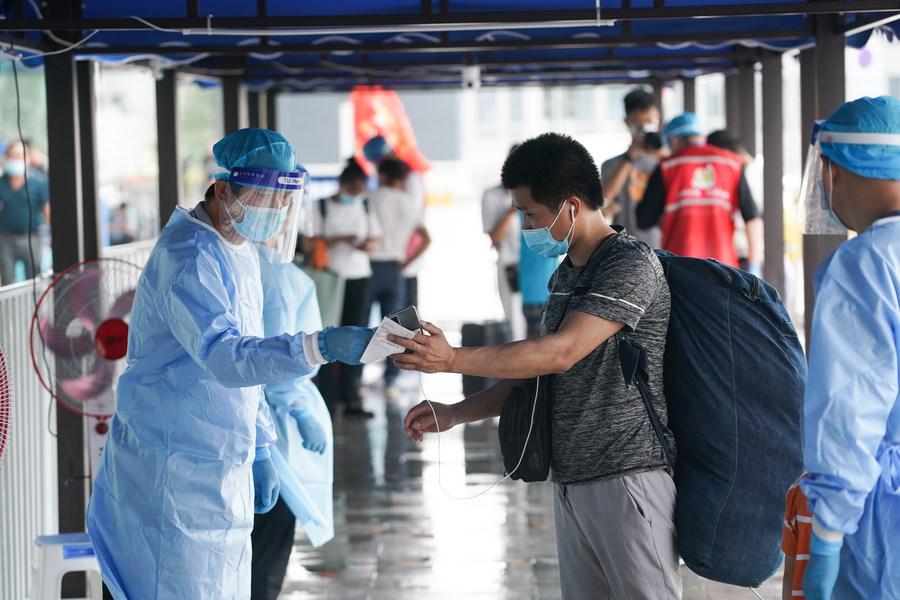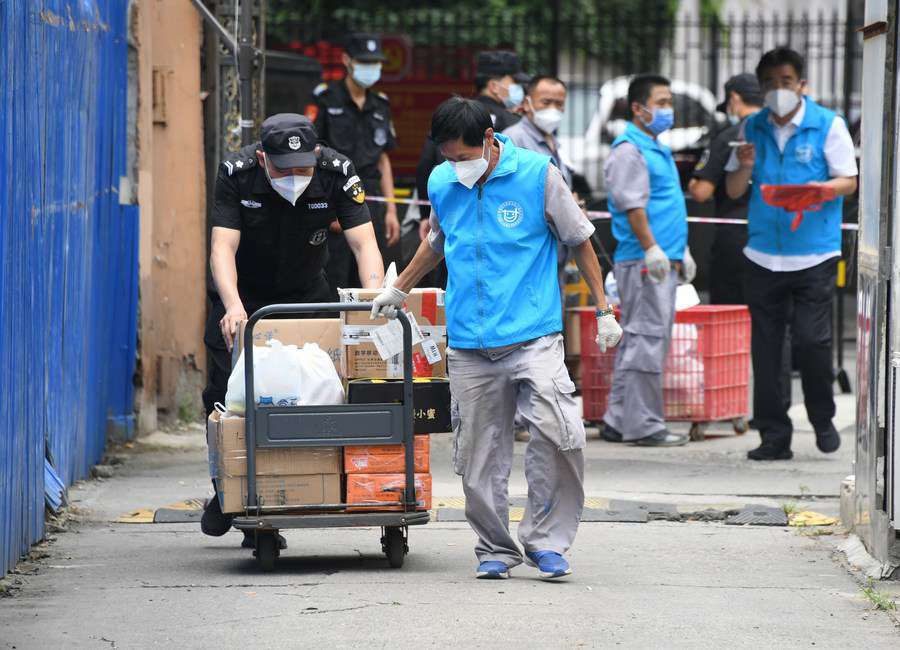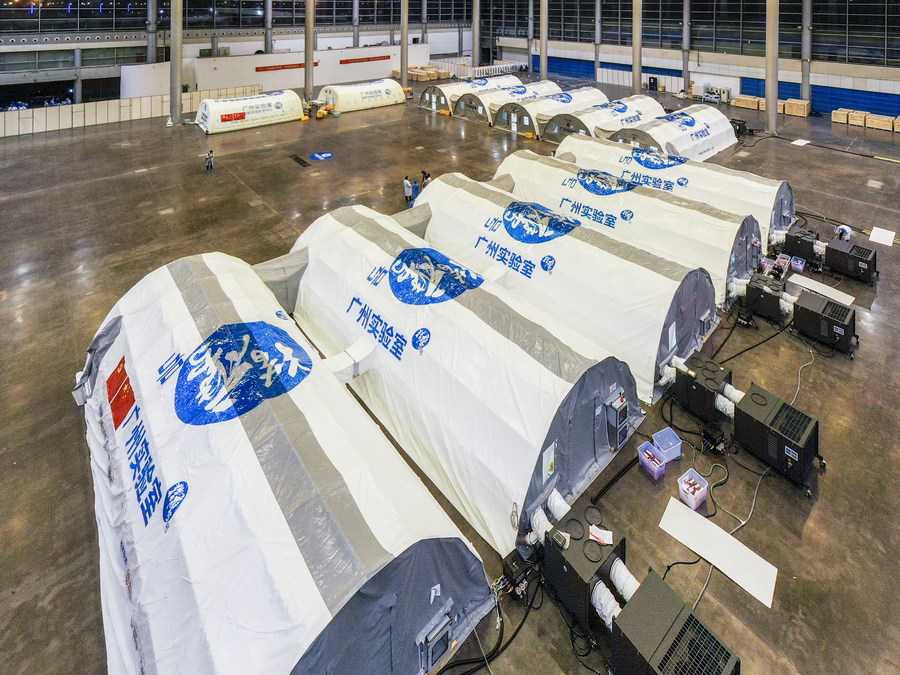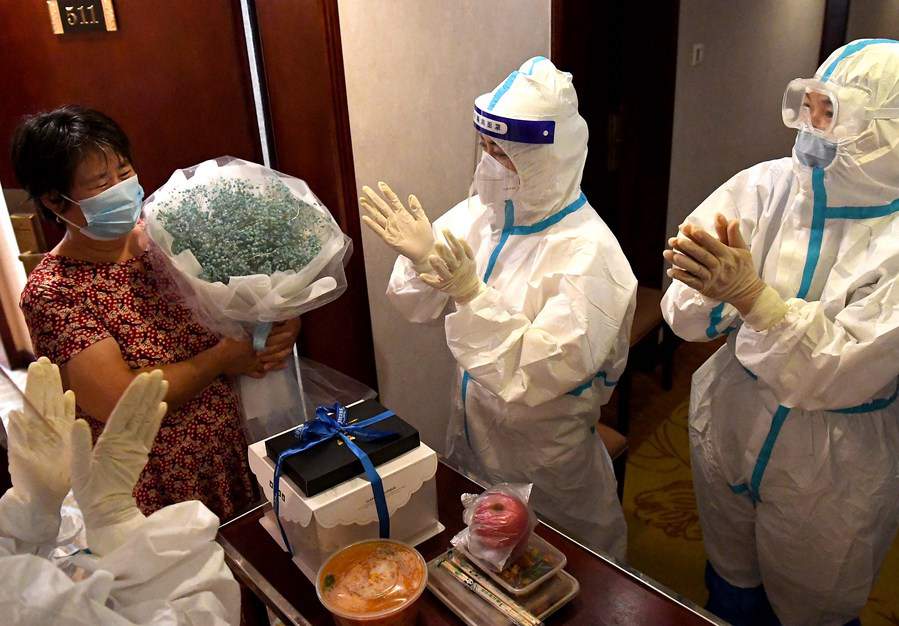What lessons could be drawn from China's combat against latest Delta outbreak?
-- The Chinese mainland reported zero new local cases for the first time in over a month on Sunday, marking an initial success in containing the most severe COVID-19 outbreak since the beginning of this year.
-- The latest resurgence since mid-July, caused mainly by the highly contagious Delta variant, has prompted resolute actions, including targeted lockdowns, travel restrictions, mass testing, and swift medical actions to contain its spread.
-- China's measures, widely supported by the public, have brought previous and its recent outbreak under control. What lessons could be drawn from China's combat against the latest Delta outbreak?
BEIJING, Aug. 23 (Xinhua) -- The Chinese mainland reported zero new local cases for the first time in over a month on Sunday, marking an initial success in containing the most severe COVID-19 outbreak since the beginning of this year.
The mainland Sunday reported 21 imported COVID-19 cases but no new locally transmitted cases, the National Health Commission (NHC) said in its daily report on Monday.
The latest resurgence since mid-July, caused mainly by the highly contagious Delta variant, has prompted resolute actions, including targeted lockdowns, travel restrictions, mass testing, and swift medical actions to contain its spread.
"Practices have proven that our prevention measures are effective. We must continue to implement these measures, strengthen weak links, and consolidate work in key areas," said Ma Xiaowei, head of the NHC, in a recent interview with Xinhua.
China's measures, widely supported by the public, have brought each outbreak under control. What lessons could be drawn from China's combat against the latest Delta outbreak?

Staff members check a passenger's identity information and health code at Nanjing Railway Station in Nanjing, capital of east China's Jiangsu Province, Aug. 23, 2021. Nanjing cleared all medium- and high-risk areas for COVID-19 on Aug. 19. (Xinhua/Ji Chunpeng)
IS LOCALIZED LOCKDOWN NECESSARY?
Local Chinese governments have taken swift measures to stem the spread of COVID-19. Measures such as timely medical treatment of confirmed cases, concentrated quarantine of close contacts, closed-management of residential communities, and suspended passenger traffic, have proven effective in rapidly controlling the epidemic, said Yu Chuanhua, an expert in epidemiology and health statistics at Wuhan University.
China's measures to control COVID-19 follow the basic principles of infectious diseases prevention and control, and have brought the epidemic under control in a short period, said Wu Zunyou, chief epidemiologist with the Chinese Center for Disease Control and Prevention.
This strategy has proven effective in rapidly controlling more than 20 imported outbreaks since the epidemic began. It is the most effective way to control acute infectious diseases like COVID-19 while controlling the economic cost, said Wu.
The latest Delta epidemic affected more than half of the provincial-level regions on the mainland. East China's Jiangsu Province reported a total of 818 local confirmed cases in this round, the most among the affected provinces.
"We have invested a lot in manpower and material costs, and the control and prevention measures have kept most of the Chinese provinces, regions, and cities free and open," said Wu. Wu added that "without the 'local control,' there would likely be a nationwide loss of control."

Volunteers and security staff deliver necessities ordered by residents under home quarantine at a community in Haidian District, Beijing, capital of China, Aug. 3, 2021. (Xinhua/Ren Chao)
DO WE STILL NEED TO WEAR MASKS?
The entire world is still struggling to cope with the crisis. Although China reported zero new local cases, the possibility of another imported outbreak is still high, warned Wu.
"Therefore, we must always adhere to the prevention and control measures of COVID-19 regularly. Previous practices have proven that vaccination, wearing masks, frequent hand-washing, maintaining social distancing, and avoiding crowds are effective," said Wu.
"If the virus mutates again, as long as you wear a mask, wash hands frequently, and keep social distance, the prevention effect will be good," Wu added.
Wu's opinions were echoed by Zhu Liguo, with the Jiangsu Provincial Center for Disease Control and Prevention. Zhu said mask-wearing and washing hands frequently could help reduce the transmission of the highly infectious Delta variant, which is also transmitted through respiratory systems.

Aerial photo taken on Aug. 14, 2021 shows "Falcon" air-inflated testing labs for COVID-19 nucleic acid testing at Yangzhou International Exhibition Center in Yangzhou, east China's Jiangsu Province. (Xinhua/Li Bo)
HOW EFFECTIVE ARE THE VACCINES?
More than 1.94 billion doses of COVID-19 vaccines had been administered in China as of Sunday, data from the NHC showed Monday.
Preliminary studies on the latest COVID-19 outbreak in south China's Guangdong Province show that China's homegrown vaccines are effective against the Delta variant. Top epidemiologist Zhong Nanshan shared China's experience in epidemic prevention and control via videolink on Aug. 20.
According to Zhong, the overall protection efficacy of China's domestic vaccines is close to 60 percent against the Delta variant and 100 percent against severe cases.
The latest data showed that antibody levels increased more than 10 times when a third dose of the domestic vaccine is given six months after the second dose, Zhong added.
"With more than 80 percent of the population vaccinated, the country could achieve an effective herd immunity," said Zhong, adding that the vaccination rate in China will likely reach more than 80 percent at the end of this year.
HOW CAN MASS TESTING STOP THE SPREAD OF THE VIRUS?
Qiu Haibo, an expert with the State Council joint COVID-19 prevention and control mechanism team, said China has been able to control the epidemic faster and faster since the COVID-19 outbreak in Wuhan, capital of central China's Hubei Province. It is mainly because rapid nucleic acid testing can identify the infected and control the source of infection.
The existing nucleic acid testing method can detect the Delta variant in time, said Zhu Liguo.
In the mass testing and testing among key population groups, the country continued to use nucleic acid testing technology and increased the testing frequency to maximize the timely detection of all infected persons, said Zhu.
Zhu Shida, director of a nucleic acid test laboratory named Huoyan, or Fire Eye, which was established by the Shenzhen-based biotech company BGI Group, said mass testing in China has now generally adopted a ten-in-one mixed testing approach.
On the premise of ensuring scientific sensitivity, this method reduces the detection amount by 90 percent compared with single tube detection, which dramatically reduces cost, said Zhu.

Wang Yaru (2nd R) and other staff celebrate the birthday of a woman under medical observation at a quarantine site in Zhengzhou, central China's Henan Province, Aug. 18, 2021. (Xinhua/Li An)
WHAT RESULTS WOULD THERE BE IF THERE IS NO CONTROL?
"As the virus mutates and spreads faster, we must respond faster. If we loosen control measures, all our efforts in the past year will go to waste, and we will have huge losses and unimaginable consequences," said Wu Zunyou.
"Our current anti-epidemic measures have avoided many infections at a relatively small cost. Thanks to our accurate and regular measures, most of the production activities in all walks of life have resumed, and economic development is positive," said Yu Chuanhua.
China's prevention and control measures reflect the value of "people first and life first." The measures are effective for safeguarding the lives of millions of people and their families and boosting economic growth, noted Wu.
Photos
Related Stories
- China urges probe into U.S. bio-lab over coronavirus "lab-leak" theory
- U.S. COVID-19 cases, hospitalizations, deaths continue to climb
- Over 1.94 bln doses of COVID-19 vaccines administered in China
- Beijing cleared of medium, high risk areas for COVID-19
- One world, two systems:"Mad kings" of the COVID-19 era
Copyright © 2021 People's Daily Online. All Rights Reserved.










